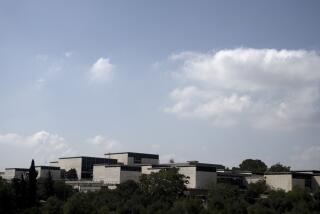Islamic State says it destroyed ancient artifacts in Mosul, Iraq
Reporting from Sana, Yemen — A video released Thursday appears to show Islamic State militants methodically destroying centuries-old artifacts in the northern Iraqi city of Mosul, which would be the group’s most brazen attack to date on antiquities regarded by the extremists as idolatrous.
Issued by the “media office of Nineveh state,” Islamic State’s name for the Mosul region, the video uploaded by the group depicts fighters roaming through Mosul’s National Museum, leaving behind what appears to be a trail of smashed Assyrian and Akkadian statues, some of which date from as far back as the 7th century BC, according to the museum plaques shown.
The five-minute video opens with militants ripping protective wrapping off statues. A bearded man appears, explaining that the artifacts are depictions of “pagan gods” that “were worshiped instead of Allah” as the camera lingers over parts of the museum.
“It is easy for us [to destroy these artifacts], and we do not care, even if they cost billions of dollars,” the militant says before the statues are pushed and kicked off pedestals by fighters with unabashed glee. They then take to them with sledgehammers and electric drills. An Islamic nasheed, or chant, plays in the background.
According to another video, the group also burned thousands of books and ancient poetry anthologies in a bonfire in a major thoroughfare in Mosul.
The authenticity of the videos could not be independently verified. Reports indicated that the items apparently destroyed at the museum consisted of originals and cast replicas, but there was no official breakdown of the extent of the damage.
Islamic State espouses a particularly harsh interpretation of sharia, or Islamic law, with punishments including amputations, crucifixions and beheadings. It also considers many artifacts, landmarks and even graves as a threat that will lead to paganism.
The group’s intolerance of historical items -- whether pre-Islamic or otherwise-- in areas under its control has raised fears of the systematic erasure of the archaeological heritage of Iraq and Syria, a region considered a cradle of modern civilization. Various rebel factions in Syria are also involved in a brisk trade of looted antiquities, authorities say.
The Sunni Muslim extremist group has destroyed numerous landmarks, churches, Shiite mosques and other sites across Iraq and Syria.
Last summer the group blew up a site in Mosul said to have been the burial place of the prophet Jonah, who figures in Jewish, Christian and Muslim traditions.
But Thursday’s apparent large-scale destruction of museum pieces and ancient writings seemed to take the campaign to a new level. The attacks drew immediate and widespread condemnation.
Atheel Najafi, governor of Iraq’s Nineveh province, issued a statement on social media saying that “what happened today in Mosul ... is a matter that goes beyond all ability to describe ugliness.”
“Is this service to the devil or hell or a valley of lowly contemptibility?” he asked.
“Daesh has ... declared its end,” he vowed, referring to Islamic State by its Arabic acronym.
An antiquities expert, Eleanor Robson of University College London, deplored the attacks in a BBC interview as “the cultural equivalent of the worst of the beheading videos,” referring to Islamic State signature video featuring beheadings of captives, including Western journalists and aid workers.
The wanton destruction comes as Iraqi and coalition planners prepare for an all-out attack on Mosul designed to oust Islamic State fighters from the city, long a cultural hub. The extremists, who belong to an Al Qaeda breakaway faction, swept through Mosul and large parts of northern Iraq in June. Christians and other minority groups fled the city and the region en masse as the extremists closed in.
It was unclear whether the extremists’ motivation was to erase as much as possible of Iraq’s cultural patrimony before government forces mount a counterattack to take back the city, once home to more than 2 million people. Iraqi Defense Minister Khaled Obeidi, in a statement to state news outlet Al Iraqiya on Thursday, indicated that pro-government forces are “ready to undertake a military operation to liberate the city.”
He also expected the “grand majority” of Mosul’s citizens to join the security forces “due to the crimes committed by Daesh.”
Iraqi troops and allied forces have been trying to push back Islamic State fighters since last summer, aided by U.S.-led airstrikes in Iraq and neighboring Syria. But the group still maintains considerable territory in its self-proclaimed caliphate across the two nations and has the support of some civilians in the area.
Bulos is a special correspondent.
Twitter: @mcdneville
More to Read
Sign up for Essential California
The most important California stories and recommendations in your inbox every morning.
You may occasionally receive promotional content from the Los Angeles Times.










